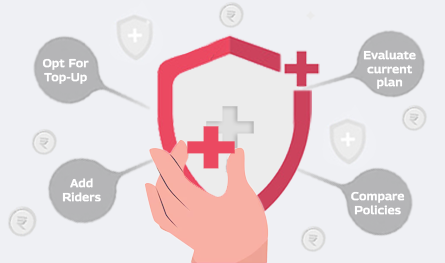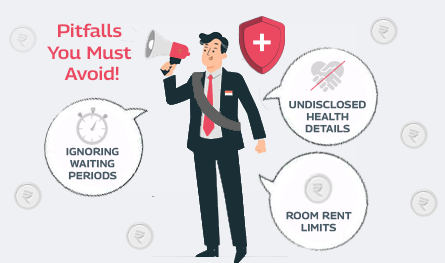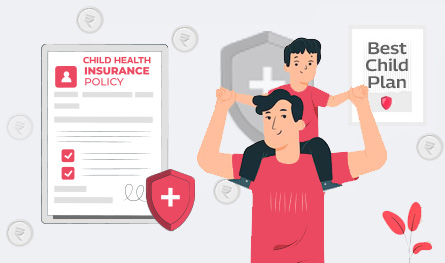Related Articles
 Jan 08, 2025
Jan 08, 2025
Is Varicose Vein surgery covered under the health insurance policy in India
 Health Insurance
Health Insurance

Taking control of your health means more than just reacting to illness; it means proactively safeguarding your well-being. With the escalating costs of medical care, a comprehensive health insurance policy is no longer optional—it's vital.

If your current plan leaves you feeling vulnerable or fails to address your evolving needs, it's time to reassess. Upgrading your coverage is about empowering yourself to manage your health confidently, knowing you have the resources to access the best possible care.
Before we discuss the how, let’s talk about the why. Upgrading your health insurance plan is about ensuring you’re adequately protected against unforeseen medical expenses. Here are a few reasons why upgrading might be a smart move:
Upgrading your health insurance policy doesn’t have to be complicated. Here are some practical steps to ensure you get the best coverage:
Start by reviewing your existing policy. What’s covered? What’s not? Are there any gaps in coverage? For instance, does your plan include critical illness coverage or maternity benefits? Understanding your current policy will help you identify what needs improvement.
Your health insurance plan should align with your lifestyle and medical requirements. For instance, if you’re planning to start a family, look for policies that offer maternity and newborn cover. If you travel frequently, consider a plan with global coverage.
Don’t settle for the first upgrade you come across. Use online comparison tools to evaluate different health insurance plans. Look at factors like sum insured, premium costs, network hospitals, and claim settlement ratios.
Consider a top-up or super top-up plan if you’re happy with your current policy but need additional coverage. These plans kick in after you’ve exhausted your base sum insured, providing extra financial protection. Plus, they’re often more affordable than buying a completely new policy.
Riders can be attached to your existing health insurance policy for extra benefits as add-ons. Common riders include critical illness cover, accidental hospitalisation, and daily cash allowance. These can be a cost-effective way to enhance your coverage without switching plans.
If your current policy is too limited, it might be time to switch to a more comprehensive health insurance plan. Look for policies that offer features like lifetime renewability, no-claim bonuses, and coverage for pre- and post-hospitalisation expenses.
When upgrading your health insurance policy, keep an eye out for these essential features:
Upgrading your health insurance plan is a big decision, and it’s easy to make mistakes. Here are a few pitfalls to avoid:
Technology has made upgrading your health insurance policy easier than ever. Many insurers now offer online portals and mobile apps where you can compare plans, calculate premiums, and even purchase policies in minutes. Tools like AI-powered chatbots can help you understand complex terms and conditions, making the process more user-friendly.
Evaluate your current plan, assess healthcare needs, compare policies, consider top-up options, and look for comprehensive plans.
Look for a higher sum insured, cashless hospitalisation, pre-existing disease coverage, no-claim bonuses, and wellness benefits.
Avoid ignoring policy fine print, choosing based only on premiums, overlooking network hospitals, and misrepresenting medical history.
Technology has made it easier with online comparisons, mobile apps, and AI chatbots that help you choose and understand policies quickly.
Young and healthy? Find out which of these plans rewards you with lower premiums. Click here to check now!

Paybima Team
Paybima is an Indian insurance aggregator on a mission to make insurance simple for people. Paybima is the Digital arm of the already established and trusted Mahindra Insurance Brokers Ltd., a reputed name in the insurance broking industry with 21 years of experience. Paybima promises you the easy-to-access online platform to buy insurance policies, and also extend their unrelented assistance with all your policy related queries and services.


Health insurance plans are purchased with the hope of medical protection in times of need. However, sometimes it ends up being a source of surprise and disappointment. This mostly happens when people rush to buy health insurance plans, often overlooking essential aspects. Ignoring waiting period clauses, misunderstanding exclusions, and being unaware of sub-limits can lead to unwanted problems in the future.


Term insurance is an important investment. However, with the availability of so many insurers offering term plans, it becomes difficult to select the best term plan to suit your needs. Buying a term plan needs some consideration and research on the part of the policyholder. In this post, let us discuss the best term insurance providers in India.


If you think of life insurance, chances are you are picturing something people buy in their 30s or 40s. But what if you are 65 or older and just getting started? The good news is that you are never too late. Whether you are thinking of easing the financial burden on your family, covering final expenses, or simply leaving behind a legacy, there are life insurance options tailored just for you.
This article will be a guide to life insurance for senior citizens above 65 years, explaining why it is important, the type of insurance options, and how to get the right policy for you.


As any parent will tell you, kids come with two things: endless energy and absolutely no sense of self-preservation. From scaling chairs and tables like mountaineers to catching germs within a five-mile radius, kids really know how to keep everyone on their toes. Now, it is understandable you are worried. As much as we would love to wrap our small ones in cotton wool and keep them safe forever, real life has other plans.

.png)
It is very important to know the car insurance cost in India so that you can find the affordable policy that you are looking for in this case.
